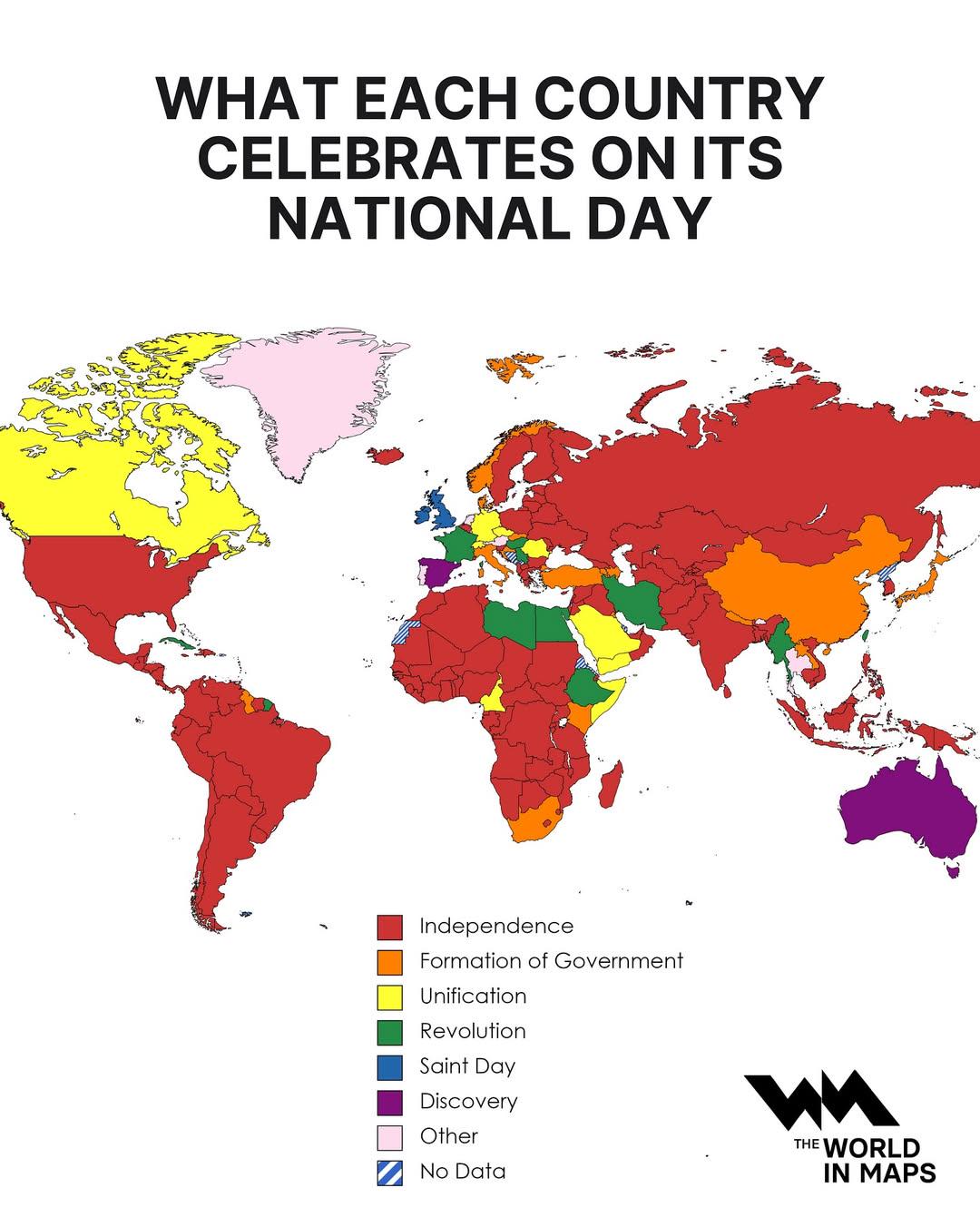National Day Celebrations by Country Map


Marcus Rodriguez
Historical Geography Expert
Marcus Rodriguez specializes in historical cartography and geographic data analysis. With a background in both history and geography, he brings unique...
Geographic Analysis
What This Map Shows
This map illustrates the unique national day celebrations observed by each country worldwide. National days are significant events in a nation's calendar, marking pivotal moments such as independence, unification, or the founding of the state. The visualization captures not only the dates of these celebrations but also highlights the diverse customs and traditions associated with each country's national day.
Deep Dive into National Day Celebrations
National days serve as a reflection of a country’s history, culture, and identity. Every nation has its own unique story to tell through its celebrations. For instance, the United States celebrates Independence Day on July 4th, commemorating the adoption of the Declaration of Independence in 1776. This day is marked by fireworks, parades, and patriotic displays, showcasing American pride.
Interestingly, some countries celebrate events that may not seem initially significant. For example, Bhutan celebrates its National Day on December 17, marking the unification of the country in 1907 under King Ugyen Wangchuck. The day is a reminder of the monarchy's role in Bhutan's development and cultural preservation. This is often celebrated with traditional dances and rituals, showcasing Bhutanese culture and heritage.
In contrast, Canada observes Canada Day on July 1st, which marks the confederation of the country in 1867. Celebrations include fireworks, concerts, and public gatherings, emphasizing national unity and pride. These events are rooted in the country’s history and reflect the values that its citizens hold dear.
Furthermore, several countries have national days that coincide with significant historical events celebrated with fervor. For instance, France celebrates Bastille Day on July 14, marking the storming of the Bastille prison in 1789, a pivotal event in the French Revolution. This day is celebrated with military parades, fireworks, and parties, symbolizing liberty and the fight against oppression.
National days often serve as an opportunity for countries to showcase their cultural richness. In Australia, Australia Day is celebrated on January 26, commemorating the arrival of the First Fleet at Port Jackson in 1788. However, this date also sparks discussions about Indigenous rights and the impact of colonization, prompting a deeper understanding of the nation’s complex history.
Regional Analysis
When examining national day celebrations across different regions, distinct patterns and themes emerge. In Africa, many countries celebrate their independence from colonial rule, often with vibrant parades and cultural displays. For instance, Ghana marks its Independence Day on March 6, celebrating freedom from British rule in 1957, while Nigeria observes its Independence Day on October 1, commemorating independence from Britain in 1960. Both of these celebrations emphasize national pride and the ongoing journey toward unity and development.
In Europe, national days often connect to historical events that shaped the nation. For example, Norway celebrates Constitution Day on May 17, honoring the signing of its constitution in 1814. The day is marked by children’s parades and traditional costumes, showcasing the country’s commitment to democracy and freedom. In contrast, countries like Germany celebrate Unity Day on October 3, marking the reunification of East and West Germany in 1990, symbolizing a new era of cooperation and unity.
Asia presents a diverse array of celebrations, with countries like India observing Republic Day on January 26, celebrating the adoption of its constitution in 1950. The day features a grand parade showcasing India's military and cultural heritage. On the other hand, China celebrates National Day on October 1, marking the founding of the People's Republic of China in 1949, with large-scale festivities and fireworks across the nation.
Significance and Impact
The significance of national day celebrations extends beyond mere festivities; they serve as a vital tool for nation-building and fostering national identity. These celebrations often encourage civic engagement and patriotism among citizens, reinforcing their connection to their country’s history and values. Moreover, they provide an opportunity for reflection on a country’s past, present, and future.
Interestingly, as globalization continues to influence cultures worldwide, some countries face challenges in maintaining their unique traditions while embracing modernity. For example, countries like Japan observe national holidays that blend ancient traditions with contemporary practices, such as the Emperor’s Birthday celebrated on February 23rd. This highlights the balance between preserving cultural heritage and adapting to global norms.
Looking ahead, the way national days are celebrated may evolve, particularly as younger generations seek to redefine national identity in an increasingly interconnected world. It’s crucial to recognize that these celebrations play a fundamental role in shaping societal values and cultural continuity, reminding us of the importance of history in our collective identities.
In conclusion, national days are more than just a date on the calendar; they are a celebration of a nation’s journey, a reflection of its identity, and a moment for citizens to come together in unity and pride. As we observe these celebrations around the world, we gain a deeper appreciation for the rich tapestry of cultures that make up our global community.
Visualization Details
- Published
- October 14, 2025
- Views
- 34
Comments
Loading comments...